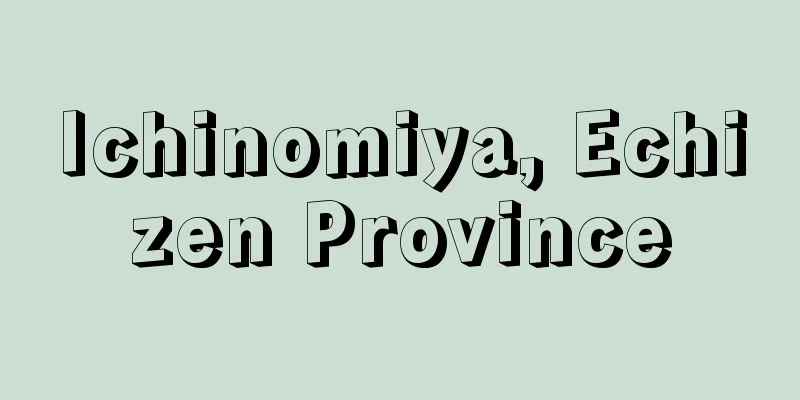Ukichi Taguchi

|
Year of death: April 13, 1905 (Meiji 38) Year of birth: April 29, 1855 (June 13, 1855) He was born as the second son of Taguchi Kashiro, a retainer of the Tokugawa family in Edo, and Machiko. His real name was Hyun, and his pen name was Teiken. He was commonly known as Uokichi, as he was born in the month of Rabbit in the year of the Rabbit. He lost his father and older brother at a young age, and grew up in extreme poverty. When the Tokugawa family was transferred to Shizuoka with the Meiji Restoration (1868), he moved to Numazu, where he studied French military science at the Numazu Military Academy. He was ordered to study medicine and went to Tokyo, where he entered the preparatory school for the University of Tokyo, but dropped out due to dissatisfaction with the classes. In 1872 (Meiji 5), he joined the Ministry of Finance Translation Bureau, where he translated Western books, which led to him studying economics. While working as a translator, he wrote letters on politics and economics to various newspapers, and in 1877 he joined the Ohmeisha, which was founded by Numama Morikazu and others. In the same year, he published the first volume of "A Brief History of the Modernization of Japan," which described the modernization of Japanese civilization from a liberal standpoint, and gained fame as a writer. He resigned from his government position in 1886, and in January of the following year, he launched the magazine Tokyo Keizai Zasshi. It was modelled on the British economic magazine Economist, and initially received support from Shibusawa Eiichi's Teizenkai, but later became independent and ran the magazine independently. Tokyo Keizai Zasshi developed a liberal theory of economics and finance, influencing the political and financial world, while publishing various economic statistics and market conditions to raise awareness of the need for economic thinking based on rational evidence. He is particularly known for his debate in 1888 with Inukai Tsuyoshi's Tokai Keizai Shinpo, which advocated protectionist economic theory. In 1890, he participated as a guest in Jiyu Shimbun, launched by the Liberal Party, and wrote editorials on economics. He also participated in the establishment of the Ryomo Railway Company, and set up the Nanto Shokai to develop the southern region, among other business ventures, but was unsuccessful. Along with economics, Taguchi was also interested in history, and in 1891 he launched the magazine Shikai, and in 1892 he reprinted Kume Kunitake's article "Shinto is the ancient custom of worshiping the gods," sparking a major debate. He made great contributions to the development of historical studies, such as realizing the publication of large-scale historical material collections Kokushi Taikei and Gunsho Ruiju. From his first election in 1892 until his death, he served as a member of the House of Representatives and was also active in politics. His opinions were consistently based on liberal thinking, and he was one of the leading debaters on economics and politics in the Meiji period. <Works> "The Complete Works of Teiken Taguchi Uyoshi," 8 volumes <References> "The Biography of Teiken Taguchi Sensei," edited by Shiojima Nikichi (Teruo Ariyama) Source: Asahi Japanese Historical Biography: Asahi Shimbun Publications Inc. About Asahi Japanese Historical Biography |
|
没年:明治38.4.13(1905) 生年:安政2.4.29(1855.6.13) 江戸の徳川家の御家人田口樫郎と町子の次男に生まれる。本名は鉉,号は鼎軒。卯年の卯月に生まれたことから通称卯吉という。幼少期に父と兄を失い,赤貧のうちに育った。明治維新(1868)によって徳川家が静岡に転封されるに伴い沼津に移り,沼津兵学校でフランス式兵学を学ぶ。医学学習を命じられて上京し,東大予備門に入ったが,授業への不満から退学。明治5(1872)年大蔵省翻訳局に入り洋書翻訳に当たったことが経済学を学ぶ契機となった。翻訳従事のかたわら諸新聞に政治論,経済論を投書,10年沼間守一らが創立した嚶鳴社に参加した。また同年,日本文明の開化を自由主義的立場から叙述した『日本開化小史』第1巻を出版し文名を高めた。 11年に官を辞し翌12年1月雑誌『東京経済雑誌』を発刊した。モデルは英国の経済雑誌『ECONOMIST』にあり,当初は渋沢栄一の択善会の援助を受けたが,のちに自立し独立で経営した。『東京経済雑誌』では,自由主義的な経済論,財政論を展開し政財界に影響を与えるとともに,各種の経済統計や市況を掲載し合理的根拠に立つ経済的思考の必要性を啓蒙した。特に13年に保護主義的経済論に立つ犬養毅の『東海経済新報』と論争を交えたことは著名である。15年自由党の創刊した『自由新聞』に客員として参加し経済関係の論説を担当した。また両毛鉄道株式会社創立に参加したり,南方開拓のための南島商会を設立するなど自ら実業に乗り出したが,成功はしなかった。経済論とならぶ田口の関心は歴史にあり,24年雑誌『史海』を発刊,25年久米邦武の「神道は祭天の古俗」を転載し大論議のきっかけをつくった。大規模な歴史資料集『国史大系』や『群書類従』の出版を実現するなど歴史学の発達に貢献するところは大きい。27年の初当選以来死去まで衆院議員を務め政界でも活躍した。彼の言論には自由主義的思考が一貫しており,明治期を代表する経済論,政論の論客であった。<著作>『鼎軒田口卯吉全集』全8巻<参考文献>塩島仁吉編『鼎軒田口先生伝集』 (有山輝雄) 出典 朝日日本歴史人物事典:(株)朝日新聞出版朝日日本歴史人物事典について 情報 |
<<: Housing development - Takuchikaihatsu
Recommend
Ono Gon'emon
A wealthy merchant in the early Edo period. A memb...
Period - Kaiki
It refers to the period during which the National...
Kolbe
German chemist. Studied under F. Wöhler at the Un...
Power factor
The ratio of effective power to apparent power in...
Hop - Hop (English spelling)
A perennial vine of the Mulberry family (APG clas...
Reinforced Wood - Kyokaboku
〘 noun 〙 Reinforced plywood is made by impregnatin...
Entertainment Pictorial - Entertainment Pictorial
A theater magazine. First published in January 19...
Assy
…Religious themes such as the Holy Face, along wi...
American Mastodon
...In the latter two genera, the lower tusks are ...
Right to sue - soken
The concept of the right of a private individual ...
Camelots du roi (English spelling)
…It was founded in 1899 by anti-Dreyfus intellect...
Miyazaki Yuzen
Years of birth and death unknown. A fan and dyeing...
Weber's line
In zoogeography, this is the distribution boundar...
Sholapur
A city in the southern tip of Maharashtra state in...
Talbot, William Henry Fox
Born: 11th February 1800, Lacock Abbey Died Septem...






![Ishikari [city] - Ishikari](/upload/images/67cae7f2ee25d.webp)


